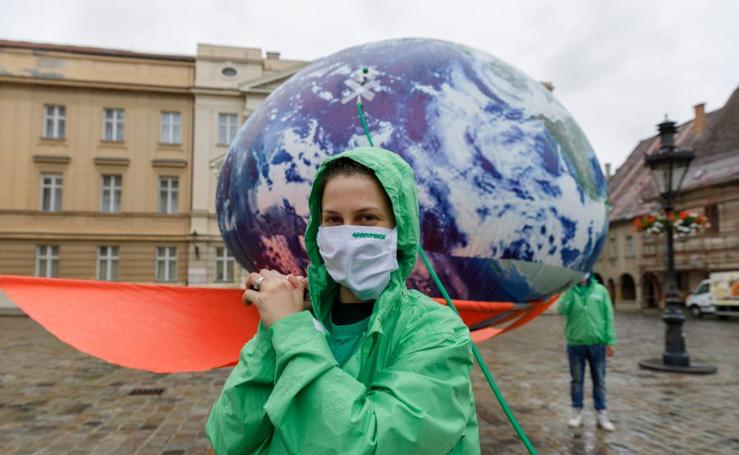11 Dec 2024

Tired Earth
By The Editorial Board

Greenpeace activists carry the installation Earth on IV Drip (Antonio Bronic/Reuters)
Fifty years ago, an ad-hoc group of environmentalists gathered around living rooms and kitchen tables in Vancouver's Kitsilano neighbourhood with a shared goal of stopping the United States from testing nuclear weapons off the western coast of Alaska.
They decided to sail a leaky, 24-metre-long halibut fishing boat directly toward the blast zone as a form of protest.
The ship was ultimately forced back, but the move drew international attention. Nuclear testing in the area ended months later.
Today, the group with small beginnings in Vancouver has grown into one of the most recognizable environmental organizations in the world. Greenpeace has a presence in more than 55 countries, with nearly three million members globally.
It's no doubt a success story for an organization with such small beginnings, but experts and early members agree that the operation will need to keep reinventing itself if it hopes to have an impact on a climate crisis more urgent than ever.
WATCH | From the Archives: Excerpt from CBC documentary profiles 12-member crew that sailed out of Vancouver in 1971:
Excerpt from a CBC documentary about the birth of Greenpeace and the 12 member crew
"There's both a sense of pride at Greenpeace and also definitely a sense that everything we've done is not enough," said Rex Weyler, who was the organization's director from 1973 to 1982.
Greenpeace has shifted priorities over the decades — from anti-nuclear issues, commercial whaling and overfishing to deforestation and the escalating climate crisis.
Its strategy of using highly visible, peaceful protest to get the public's attention has been another key.
"That's really where Greenpeace has excelled over time," said Lisa Sundstrom, a political science professor at the University of British Columbia in Vancouver who studies non-governmental organizations.
"They got their start by having vessels in the oceans that were stopping environmental or nuclear damage of various kinds, heading off warships ... and it is these really dramatic moments that have been caught on film, and everybody around the world gets to know them for doing this," she said.
"They've kept that up to a certain degree but [while] simultaneously managing to become quite professionalized and disciplined."
Greenpeace's next challenge will be connecting with younger, grassroots activists at the community level despite being an international giant. It will also have to come up with new strategies to hold the public's attention.
Speaking from his home on Cortes Island in B.C., Weyler said the organization's explosive growth has been beyond what the earliest members could have expected.
"We wanted the movement to be international, but no, we didn't quite imagine that Greenpeace would be as huge and successful as an organization as it has been," he said.
An activist for half a century, Weyler says he knows the road to change is long, and he understands, acutely, how easy it can be for the younger generation to feel powerless about making change.
On that, he shared his advice.
"You have to be willing to understand that no single generation is going to fix the world. It's going to take generations to approach solving this," Weyler said.
"You just have to keep going. You have to have courage — but every moment of your life cannot be about changing the world. It's overwhelming. You have to take care of yourself. You have to take care of your family," he said.
"All you can do is make a contribution as best you can."
Source : cbc.ca
Comment